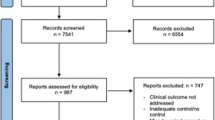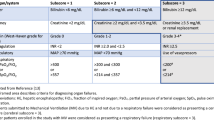Abstract
Objective
To assess the methodological quality of clinical research on Chinese medicine (CM) applied by intra-arterial infusion in treating primary liver cancer (PLC).
Methods
Cochrane Central Register of Controlled Trials (CENTRAL), PubMed, and three Chinese databases, including Chinese BioMedical Database (CBM), China National Knowledge Infrastructure (CNKI) and China Academic Journal (VIP) were searched. Chinese articles were also searched manually in 16 journals. Two reviewers independently selected studies, the quality of literatures were assessed according to the Cochrane Collaboration method of quality assessment.
Results
A total of 14 articles met the inclusion criteria for this review. Only three of these articles described the randomization method used. None of the studies was blinded. All of the articles didn’t report the calculation of the sample size. Only six studies mentioned adverse reactions. All of the studies were of grade C according to the Cochrane Collaboration method. Six studies reported results of survival, and only two of these reported better efficacy in the treatment groups.
Conclusions
The quality of studies concerned intra-arterial infusion of CM in treating with PLC was poor and the exact effect of these medicines still need evaluation. Well designed RCTs with large sample sizes, adequate follow-up data and reliable methods of assessment are needed to better appraise the real effect of CMs in the treatment of PLC patients.
Similar content being viewed by others
References
Tang ZY, Ye SL, Liu YK, Qin LX, Sun HC, Ye QH, et al. A decade studies on metastasis of hepatocellular carcinoma. J Cancer Res Clin Oncol 2004;130:187–196.
Camma C, Schepis F, Orlando A, Albanese M, Shahied L, Trevisani F, et al. Transarterial chemoembolization for unresectable hepatocellular carcinoma: meta-analysis of randomized controlled trials. Radiology 2002;224:47–54.
Llovet JM, Bruix J. Systematic review of randomized trials for unresectable hepatocellular carcinoma: chemoembolization improves survival. Hepatology 2003;37:429–442.
Llovet JM, Real MI, Montana X, Planas R, Coll S, Aponte J, et al. Arterial embolisation or chemoembolisation versus symptomatic treatment in patients with unresectable hepatocellular carcinoma: a randomized controlled trial. Lancet 2002;359:1734–1739.
Lo CM, Ngan H, Tso WK, Liu CL, Lam CM, Poon RT, et al. Randomized controlled trial of transarterial lipiodol chemoembolization for unresectable hepatocellular carcinoma. Hepatology 2002;35:1164–117.
Llovet JM, Bruix J. Unresectable hepatocellular carcinoma: meta-analysis of arterial embolization. Radiology 2004;230:300–301.
Bruix J, Sala M, Llovet JM. Chemoembolization for hepatocellular carcinoma. Gastroenterology 2004;127:S179–S188.
Dong BR, Xiao M. The study of prevention disease with regard to the control problems. Chin J Intern Med (Chin) 1999;38:799–801.
World Health Organization. General guidelines for methodologies on research and evaluation of traditional medicine. Geneva, World Health Organization, 2000. (document reference WHO/EDM/TRM/2000.1).
Higgins JPT, Green S. Cochrane Handbook for Systematic Reviews of Interventions 4.2.5. http://www.cochrane.org/resources/handbook/hbook.htm.
Wu TX, Li YP, Bian ZX, Li TQ, Li J, Dagenais S, et al. Consolidated standards for reporting trials of traditional Chinese medicine (CONSORT for TCM). Chin J Evid-Based Med 2007;7:625–630.
Zhang XP, Yi YH, Jin P, Xie ZG. Clinical effects of the suspensions of supermicro-bletilla striata powder used as embolization agents on primary hepatic cancer. Pract J Med Pharm (Chin) 2006;23:288–289.
Wang TC, Jiang M, Cui F. Clinical effects of the suspensions of Ai di injection used as embolization agents on late primary hepatic cancer. Shangdong Med J (Chin) 2009;49(20):103–104.
Wang ZF. Clinical effects of the suspensions of Compound Kushen Injection used as embolization agents on late primary hepatic cancer. Shangdong Med J (Chin) 2009;49(8):102.
Song J, Xu H, Tang JQ, Li X, Zhou S. Transcatheter hepatic arterial infusion chemotherapy combined with element emulsion for treatment of primary hepatic carcinoma. China Pharm (Chin) 2007;16(16):23–24.
You SY, Fan H, Huan ZG, Yang J, Su XH, Zhang B. Clinical study on the treatment of intermediate and advanced stage liver cancer with combination of arterial perfusion of cinobufotalin and embolotherapy. Hebei Med (Chin) 2006;12:1096–1100.
Wang CJ, Chen QQ, Deng L, Lu QH, Liang J. Hepatic artery infusion of Cinobufotain for treating advance hepatocellular carcinoma. Chin J Integr Tradit West Med Liver Dis (Chin) 2001;11(1):5–7.
Feng YZ, Zhao WH, Ma ZM, Zhou XR, Wang M, Sheng JM. Transcatheter hepatic artery infusion with Colxcis Semen Yokulnin in treatment of advanced HCC. China J Cancer Prev Treat (Chin) 2001;8:310–311.
Fan WJ, Zhang FJ, Shen JL, Hu W, Huang JH, Wu PH. 82 cases of hepatic artery infusion of Lanxiangxi Injection for treating advance hepatocellular carcinoma. Clin Med China (Chin) 2001;17:310–311.
Song AY, Tan H, Bi JF. Clinical study on the treatment of intermediate and advanced stage liver cancer with combination of arterial perfusion of brucine in and embolotherapy. Acta Chin Med Pharm (Chin) 2007;35(5):28–29.
Lou YC, Zhang H, Song JP. Influence of artesunate on the immune function of patients with primary liver cancer. Modern J Integr Tradit Chin West Med (Chin) 2009;12:1327–1329.
Cui SZ, Wu YB, Wang JK, Tang YQ, Tang RJ, Wang B, et al. Continuous regional chemotherapy using arsenic trioxide for primary hepatic carcinoma. J Modern Clin Med Bioengin 2006;12:433–434.
Zhang HB, Zhou RY. Clinical observation of Spica prunellae and Kangyan I Injections in treating late primary liver cancer by liver arterial perfusion. Shanghai J Trandit Chin Med (Chin) 2000;10(5):18–20.
Lu QH, Deng L. Clinical study on the treatment of intermediate and advanced stage liver cancer with combination of arterial perfusion of Xiaoaiping Injection in and embolotherapy. Modern J Integr Tradit Chin West Med (Chin) 2004;13:2690–2691.
Wu JY. An analysis of hepatic carcinoma patients accepting with combination of arterial perfusion of cinobufotalin and embolotherapy via drug box implantation system. Modern J Integr Tradit Chin West Med (Chin) 2006;15:1313–1314.
Eisenhauer EA, Therasse P, Bogaerts J, Schwartz LH, Sargent D, Ford R, et al. New response evaluation criteria in solid tumours: revised RECIST guideline (version 1.1). European Journal of Cancer 2009;45:228–247.
Author information
Authors and Affiliations
Corresponding author
Rights and permissions
About this article
Cite this article
Zhai, Xf., Qiao, Cx., Liu, Q. et al. Quality assessment of clinical research on liver cancer treated by intra-arterial infusion of Chinese medicine. Chin. J. Integr. Med. 20, 870–875 (2014). https://doi.org/10.1007/s11655-013-1555-y
Received:
Published:
Issue Date:
DOI: https://doi.org/10.1007/s11655-013-1555-y




